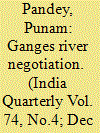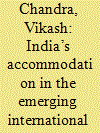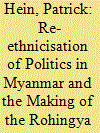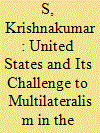|
|
|
Sort Order |
|
|
|
Items / Page
|
|
|
|
|
|
|
| Srl | Item |
| 1 |
ID:
162427


|
|
|
|
|
| Summary/Abstract |
Protection of civilians has remained problematic either when it occurs or when it does not. And this has generated heated debate among several theoretical schools, with grave consequences for international relations theorising. The Libya crisis in 2011 represents one of those cases that has led to arguments and counter-arguments, particularly on justification, agency, means and outcomes of the intervention. This study interrogates as to what extent cosmopolitanism shaped the need to protect civilians in the Libya crisis, the successes, challenges and the consequences of cosmopolitanism on the Libya intervention. The study argues that even though cosmopolitanism bears a large part in informing the need to protect civilians in Libya, the way and manner the intervention turns out to be poses a serious challenge to cosmopolitanism. Hence, there is the need for cosmopolitanism to think beyond justifying intervention to monitoring actors involved, institutions, intervention processes as well as the post-intervention era, especially in terms of rebuilding.
|
|
|
|
|
|
|
|
|
|
|
|
|
|
|
|
| 2 |
ID:
162430


|
|
|
|
|
| Summary/Abstract |
Negotiations between neighbours over river disputes are not only about water, they come embedded with other bilateral concerns. Thus, the solution of a river dispute depends on comparative bargaining capabilities of riparians on their many other contentious matters. This assumption has been applied in investigating and analysing the Ganges River negotiation between India and Bangladesh. The literature on the Ganges has focussed on integrated river development perspectives. The present analysis underlines the convergence of water with other bilateral concerns. The examination of a quarter-century negotiation on the Ganges confirms the correlation between positive outcomes and better linkages between multiple issues.
|
|
|
|
|
|
|
|
|
|
|
|
|
|
|
|
| 3 |
ID:
162429


|
|
|
|
|
| Summary/Abstract |
This article has two-fold goals: to develop a coherent concept of accommodation and explicate variable shaping the process of accommodation; and to analyse and evaluate the challenges and prospects of India’s accommodation in the emerging international order. It defines accommodation as a ‘state strategy’ and ‘process’. It figures out six determinants viz. the sphere of influence, structural variables, convergence/divergence of national interest, perception and intention towards the international order, political and socio-cultural values, and costs of non- accommodation. Instead of addressing the process of accommodation from accommodation-seekers’ perspective, the article investigates the issue from accommodators’ perspective. Therefore, rather than describing traditional foundations of India’s claim of accommodation, i.e. population, territory, military, and democracy, it illustrates conditions under which the established power accommodate rising powers. By comparing and contrasting India’s interests, principles, and values vis-à-vis the USA and China, it demonstrates how differing strategic calculations, economic and commercial interests and divergence in political socio-cultural norms and values, China is posing or may pose challenges to India’s accommodation. It suggests that India needs to strike a balance between the declining America and rising China. It will have to learn how not to turn China from an adversary to an enemy. A prudent strategy for India will be to balance China, however, in the non-military, i.e. diplomatic, political and economic realms. Nevertheless, the engagement dimension should not be marginalised, actual or even perceived.
|
|
|
|
|
|
|
|
|
|
|
|
|
|
|
|
| 4 |
ID:
162426


|
|
|
|
|
| Summary/Abstract |
In Myanmar, hostilities between the majority Burmese and the minority Rakhine people on one side and the minority Rohingya on the other side have been common, but violence has persisted and even increased during the unstable transition away from an authoritarian regime. Most Burmese citizens appear to be united behind the ruling elites on the Rohingya issue. Why is the violence assumed to be of ethnic origin and whose interests are served by the acceptance of such violent acts as routine events? The article attempts to seek answers by following Brass’s framework on Hindu–Muslim violence in India. Its purpose is to examine which actors, mechanisms and institutional developments have been dominant and significant in the re-ethnicisation of the political landscape in Myanmar and how this has consolidated the formation of a contentious and contested specific Rohingya group identity among many Arakanese Muslims.
|
|
|
|
|
|
|
|
|
|
|
|
|
|
|
|
| 5 |
ID:
162431


|
|
|
|
|
| Summary/Abstract |
India has now emerged as a major space-faring nation with notable accomplishments in the launch vehicle, satellite, space application and space exploration domains in spite of beginning its space programme from a disadvantageous position vis-à-vis other space-faring nations of the day, besides endeavouring entirely in the civilian domain. International cooperation played an important role during the genesis and the early evolution of the Indian space programme and has played a complimentary role during the progressive accumulation of India’s current space capabilities. Once a recipient of assistance in the domain of space, in the new millennium, India has achieved the status of an equal and even a major partner in some of the joint space endeavours with its erstwhile benefactors and has established facilities for training space personnel from developing countries of the Asia-Pacific region. This article critically reviews India’s international space cooperation endeavour in the past five decades and its influence on the country’s current space capabilities.
|
|
|
|
|
|
|
|
|
|
|
|
|
|
|
|
| 6 |
ID:
162428


|
|
|
|
|
| Summary/Abstract |
With Donald Trump as President of United States, multilateralism in the world economy is facing an unprecedented challenge. The international economic institutions that have evolved since the fifties are increasingly under the risk of being undermined. With the growing assertion of the emerging and developing economies in the international fora, United States is increasingly sceptical of its ability to maneuvre such institutions to suit its own purpose. This is particularly true with respect to WTO, based on “one country one vote” system. The tariff rate hikes initiated by the leader country in the recent past pose a serious challenge to the multilateral trading system. The paper tries to undertake a critical overview of the US pre-occupation of targeting economies on the basis of the bilateral merchandise trade surpluses of countries, through the trade legislations like Omnibus Act and Trade Facilitation Act. These legislations not only ignore the growing share of the United States in the growing invisibles trade in the world economy, but also read too much into the bilateral trade surpluses of economies with United States and the intervention done by them in the foreign exchange market.
|
|
|
|
|
|
|
|
|
|
|
|
|
|
|
|
|
|
|
|
|